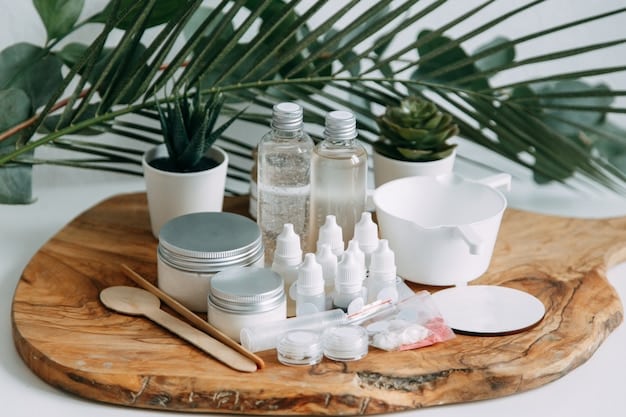Sensitive Skin Solutions: Gentle Routine for Redness & Irritation

Sensitive skin requires a skincare routine that prioritizes gentle ingredients and soothing practices to minimize irritation and redness, focusing on hydration and protection rather than harsh exfoliants or fragrances for long-term skin health.
Navigating the world of sensitive skin solutions: a gentle skincare routine that soothes irritation and redness can feel overwhelming. But with the right approach, you can achieve a calm, healthy complexion without the frustration.
Understanding Sensitive Skin
Sensitive skin isn’t a specific skin type but rather a condition characterized by skin that’s easily irritated. This can manifest as redness, itching, burning, dryness, or stinging sensations in response to triggers that wouldn’t bother normal skin.
Several factors contribute to skin sensitivity, ranging from environmental influences to underlying health conditions. Identifying your specific triggers is crucial for managing sensitivity effectively.
Common Causes of Sensitive Skin
Understanding the root causes of your skin sensitivity is the first step toward relief. Here are some common culprits that can contribute to reactive skin:
- Environmental Factors: Harsh weather conditions like extreme cold, wind, or sun exposure can strip the skin of its natural moisture barrier, leading to increased sensitivity.
- Irritating Ingredients: Many skincare and cosmetic products contain ingredients such as fragrances, dyes, alcohol, and harsh preservatives that can trigger reactions in sensitive skin.
- Allergens: Certain allergens, such as pollen, dust mites, or pet dander, can cause allergic reactions that manifest as skin irritation, redness, and itching.
- Underlying Skin Conditions: Conditions like eczema, rosacea, and psoriasis can compromise the skin’s barrier function, making it more vulnerable to irritants.
Beyond external aggressors, internal factors such as stress, hormonal fluctuations, and diet can play a role in the health and sensitivity of your skin. Keeping a journal to track your skin’s reactions to new products, foods, or environmental changes can help pinpoint your specific triggers.

Building a Gentle Skincare Routine
Creating a skincare routine tailored for sensitive skin involves prioritizing gentle, fragrance-free, and hypoallergenic products. A minimalist approach, focusing on essential steps, is often the most effective.
Each product should be carefully chosen to support the skin’s natural barrier and minimize the risk of irritation.
Essential Steps for Sensitive Skin
The foundation of any good skincare routine for sensitive skin includes cleansing, moisturizing, and sun protection. Here’s how to approach these steps with sensitivity in mind:
- Cleansing: Choose a mild, soap-free cleanser that’s designed for sensitive skin. Avoid harsh sulfates and fragrances, opting instead for gentle formulas that effectively remove dirt and impurities without stripping the skin’s natural oils.
- Moisturizing: A good moisturizer is crucial for hydrating and protecting sensitive skin. Look for ingredients like ceramides, hyaluronic acid, and glycerin, which help to restore the skin’s natural barrier and lock in moisture.
- Sun Protection: Sunscreen is a non-negotiable step, even for sensitive skin. Opt for a mineral-based sunscreen containing zinc oxide or titanium dioxide, as these are less likely to cause irritation than chemical sunscreens.
Applying products in the correct order can also enhance their effectiveness. Generally, it’s best to apply products from thinnest to thickest consistency. This allows thinner products to be absorbed before thicker ones create a barrier.
This routine helps to soothe and protect the skin. With consistency and care, it’s possible to achieve a healthier, more comfortable complexion, even for those with the most reactive skin.
Choosing the Right Products
Selecting the right products is paramount when dealing with sensitive skin. Ingredients can either be allies, helping to soothe and protect, or enemies, triggering irritation and discomfort.
Prioritize products labeled “fragrance-free,” “hypoallergenic,” and “non-comedogenic.” Always patch-test new products on a small area of skin before applying them to the entire face.
The Importance of Reading Labels
Becoming familiar with common irritants found in skincare products can help you make informed choices. Some ingredients to avoid include:
- Fragrances: These are a major cause of skin irritation and allergic reactions. Look for products that are fragrance-free, rather than just “unscented.”
- Alcohol: While some alcohols are beneficial, others, like denatured alcohol, can be drying and irritating to sensitive skin.
- Sulfates: These are harsh detergents that can strip the skin of its natural oils, leading to dryness and irritation.
- Essential Oils: While natural, some essential oils can be potent irritants, especially for sensitive skin.
Understanding these potential irritants empowers you to make smarter choices about the products you use. By carefully reading labels and selecting products with minimal, gentle ingredients, you can significantly reduce the risk of triggering a reaction.
Consider incorporating products with calming ingredients, such as aloe vera, chamomile, and green tea extract, which can help to soothe and reduce inflammation in sensitive skin. These natural ingredients offer gentle relief and support the skin’s natural healing process.

Lifestyle Adjustments for Sensitive Skin
Managing sensitive skin extends beyond skincare products. Certain lifestyle factors can significantly impact skin health and sensitivity.
Making conscious choices about your diet, stress levels, and even the fabrics you wear can contribute to a calmer, less reactive complexion.
Minimizing Irritation from External Factors
Beyond ingredient lists, the environment and certain habits can also affect your skin. Some practical tips for minimizing irritation include:
- Use Lukewarm Water: Hot water can strip the skin of its natural oils, exacerbating dryness and sensitivity. Opt for lukewarm water when cleansing or showering.
- Pat Skin Dry: Rather than rubbing your skin with a towel, gently pat it dry to avoid irritation.
- Wear Soft Fabrics: Choose clothing made from soft, breathable fabrics like cotton or silk to minimize friction and irritation.
Maintaining a healthy lifestyle is crucial for overall skin health. Eat a balanced diet rich in antioxidants, stay hydrated, and manage stress levels through activities like yoga, meditation, or spending time in nature.
By addressing these lifestyle factors, you can create a holistic approach to managing sensitive skin, promoting both internal and external well-being.
Dealing with Flare-Ups
Even with a consistent and gentle skincare routine, flare-ups can still occur. Knowing how to respond quickly and effectively can minimize their impact.
Identifying the cause of the flare-up is the first step toward addressing it. Common triggers include new products, changes in weather, stress, or certain foods.
Soothing Techniques for Irritated Skin
When a flare-up occurs, focus on gentle relief and avoid harsh treatments. Some soothing techniques include:
- Cool Compresses: Applying a cool, damp compress to the affected area can help to reduce redness, itching, and inflammation.
- Oatmeal Baths: Colloidal oatmeal has anti-inflammatory properties that can soothe irritated skin. Add it to a lukewarm bath for relief.
- Hydrating Masks: A simple, fragrance-free hydrating mask can help to restore moisture and calm irritated skin.
In recalcitrant cases, don’t hesitate to consult a dermatologist for personalized advice and prescription treatments. A professional can evaluate your specific skin condition and recommend the most effective course of action.
Flare-ups are a normal part of living with sensitive skin. When managed with care and attention, they can be effectively navigated, minimizing discomfort and promoting skin health.
Long-Term Skincare Strategies
Managing sensitive skin is an ongoing process that requires consistent care and attention. Developing long-term skincare strategies can help minimize sensitivity and maintain a healthy complexion over time.
This includes sticking to a gentle skincare routine, making informed product choices, and implementing lifestyle adjustments to minimize triggers.
The Importance of Consistency and Patience
Consistency is key when it comes to managing sensitive skin. Avoid constantly switching products or trying new treatments, as this can disrupt the skin’s natural balance. Some things to consider:
- Stick to a Routine: Establish a consistent skincare routine and stick to it. This helps to create a stable environment for your skin.
- Introduce Products Slowly: When introducing new products, do so one at a time and patch-test them thoroughly to monitor for any adverse reactions.
- Be Patient: It can take time to see results from a new skincare routine. Be patient and give your skin time to adjust and heal.
Regular follow-up with a dermatologist can help you stay on track with your skincare goals. A professional can assess your skin’s progress and make recommendations for adjustments as needed.
Long-term management of sensitive skin is about building a sustainable skincare routine, making informed choices, and seeking professional guidance when needed. By prioritizing consistency, patience, and a holistic approach, you can maintain healthy, comfortable skin for years to come.
| Key Point | Brief Description |
|---|---|
| ✨ Gentle Cleansing | Use mild, soap-free cleansers to avoid stripping natural oils. |
| 💧 Hydrating Moisturizers | Opt for moisturizers with ceramides and hyaluronic acid. |
| ☀️ Mineral Sunscreen | Choose zinc oxide or titanium dioxide-based sunscreens. |
| 🌱 Soothing Ingredients | Look for products with aloe vera, chamomile, or green tea. |
Frequently Asked Questions (FAQs)
▼
Sensitive skin is characterized by its proneness to irritation, often reacting with redness, itching, or burning sensations when exposed to certain products or environmental factors. It’s not a skin “type,” but a condition.
▼
Cleansing once a day, ideally at night, is typically sufficient for sensitive skin. Over-washing can strip the skin of its natural oils, leading to dryness and irritation. Use a gentle cleanser.
▼
While some essential oils can be beneficial, many are potent irritants for sensitive skin. It’s best to avoid products with essential oils or patch-test carefully and use diluted forms.
▼
Yes, diet can play a role. Consuming anti-inflammatory foods rich in antioxidants and staying hydrated can help improve skin health and reduce sensitivity. Also, stay away from foods that may trigger inflammation or allergies.
▼
If your sensitive skin is consistently irritated, or if you experience severe reactions or suspect an underlying skin condition, consult a dermatologist for personalized advice and treatment options. They may determine if you have allergies or other issues.
Conclusion
Managing sensitive skin is a journey that requires patience, consistency, and a gentle approach. By understanding the unique needs of your skin and implementing a tailored skincare routine, you can achieve a calm, healthy complexion. With the right knowledge and products, those prone to irritation and redness can find daily comfort and long-term relief.





